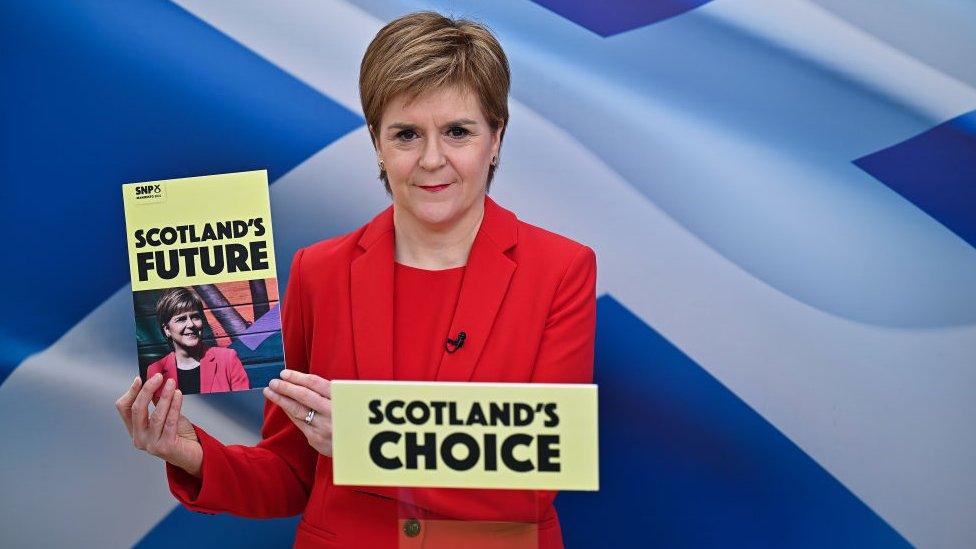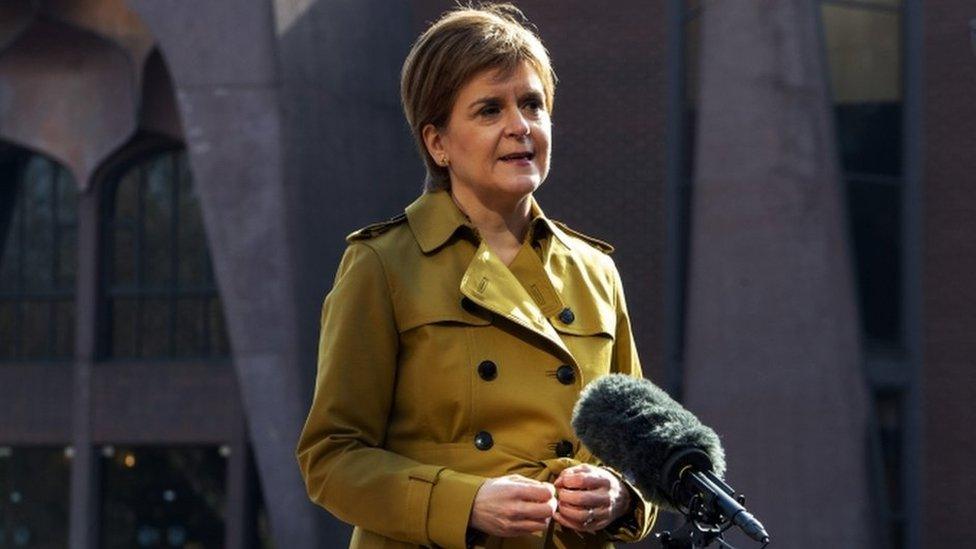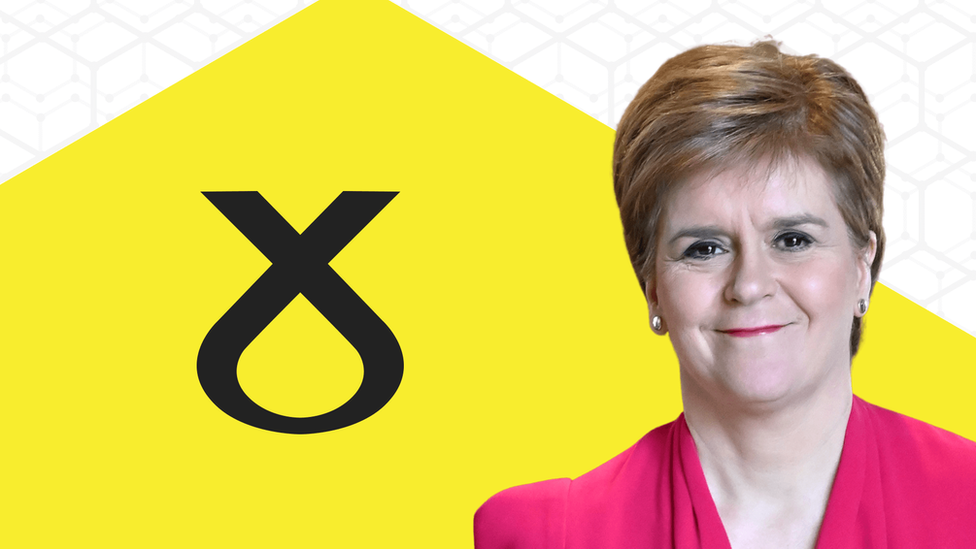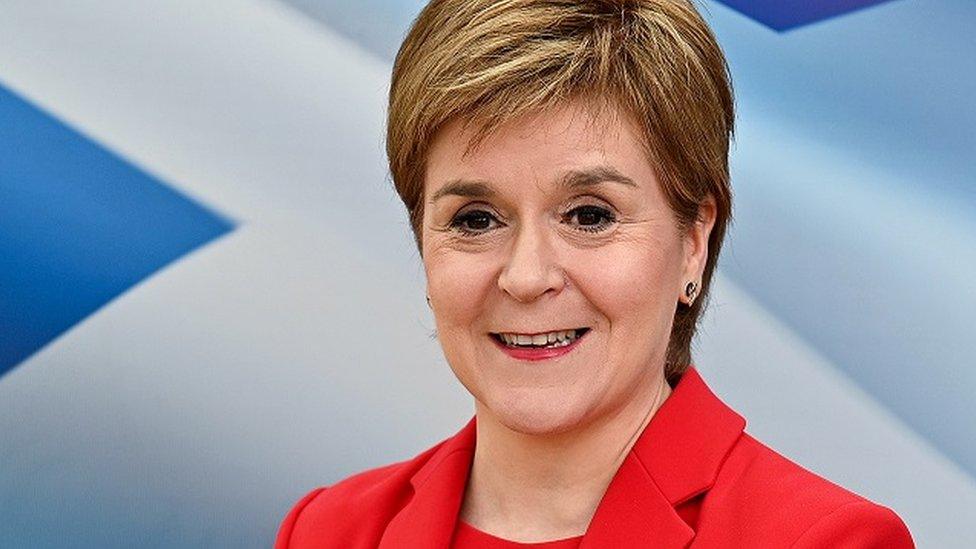Scottish election 2021: SNP policies explained
- Published

The Scottish National Party have launched their 2021 election manifesto. The full document, external runs to 76 pages. So, what is the party promising? BBC Scotland's correspondents have been analysing the pledges.
1. Indyref2, if there's a pro-independence majority at Holyrood

The constitutional position in the SNP manifesto is a simple and by now very familiar one - the party wants to have a new referendum on independence in the first half of the next Holyrood term, if a majority of MSPs back the idea.
The text is explicit that "we are seeking the permission of the Scottish people in this election to hold an independence referendum, to take place after the [Covid] crisis".
This is a straightforward pitch for several reasons. Firstly, it meshes easily enough with the Green manifesto - which makes an effectively identical pledge - in the event the SNP falls short of a majority on its own and needs some help to get over the line.
And secondly it looks ahead to the clash with the UK government which will likely follow the election. The clearer and plainer the position, the easier it will be for Nicola Sturgeon to argue there is a mandate for indyref2 both in the eyes of the voting public, and in a political row with Boris Johnson.

SCOTLAND ALERTS: Get extra updates on BBC election coverage

2. Increase health spending and recruit staff

Scotland already spends more per head of population on health services than other parts of the UK and the promise here is to up that even more - but increased spending alone won't be enough.
The SNP committed to building regional centres of excellence for procedures like hips, knees and cataracts back in 2015, and more recently channelled £850m into improving waiting times. Even pre-pandemic, progress was slow. Now, more than 85,000 people are on waiting lists for hospital treatment - with more than 15,000 waiting over a year.
So, it is a bold promise to increase capacity for non-urgent procedures by 10% and commit to getting waiting times back on track.
Other pledges include establishing a national care service. One thing the pandemic made clear is the uneven relationship between health and social care - despite Scotland already having progressive policies in place.
The key question is where would the staff come from? There is a pledge to recruit at least 1,500 additional NHS staff and increase medical school training places.
But it sits against official figures that show many vacancies going unfilled.
3. Close the attainment gap

Before the 2016 Holyrood election, Nicola Sturgeon said she wanted to be judged on her progress in closing the poverty-related attainment gap.
Five years later, Audit Scotland has found the difference between how well those from the richest and poorest backgrounds do at school "remains wide".
The SNP says progress has been made but more needs to be done. The party would spend £1bn during the term of the next parliament on measures to help education recover from the pandemic and close the attainment gap.
The party adds that it would make sure schools had more control over how that money was spent because they know which individuals need extra help and support. This targeted approach to Covid "catch up" has differences to what is planned for English pupils, where more structured schemes are likely to take place over the summer.
4. Freeze current income tax rates

The health service continues to grab more of Holyrood's budget, and the latest SNP plans for a 20% uplift in frontline spending would push it well over half of total spend.
Allied to other pledges for more teachers, welfare benefits and housing, the implications for lower political priorities are likely to bring a squeeze.
Can it be afforded? That depends on the uncertain outlook for the economy, tax revenue and the block grant from Westminster. Nicola Sturgeon isn't adding up the numbers, instead referring the question to a "central scenario" of what might happen over the next five years, external.
That depends on big assumptions by the Office for Budget Responsibility and Scottish Fiscal Commission, both of them independent and both highlighting the uncertainty of their forecasts.
The intention is to avoid any rise in income tax rates, already one percentage point higher than Westminster's. That could still allow tax revenue to rise if thresholds are frozen. The manifesto states only that they would not rise above inflation - so no income tax giveaways. If frozen, the Fraser of Allander Institute reckons a further 100,000 Scots tax-payers could move into the 41% higher rate tax band over the next five years, taking the total to around 550,000.
On council tax, the SNP has given up on proposing reform, instead hoping a consensus could emerge from cross-party talks and a Citizens' Assembly. Fourteen years in office have taught the SNP leader that it's easy to be against council tax, but much more difficult to replace it.
So by the 2026 election, with change looking glacial, it seems likely we will be marking the 35th anniversary of the valuations on which our council tax bills are based, also leaving those on lower income paying a higher share towards it.
5. Double the Scottish Child Payment

Last month a report revealed child poverty in Scotland rose in the last three years. About 240,000 children are classed as living in poverty, with two-thirds of them in working families. The pandemic is expected to make the problem even worse.
Like the Scottish Greens, the SNP has pledged to double the Child Payment. While the benefit is still being rolled out for older children until late 2022, the SNP also plans to introduce a £520 cash grant for families on benefits.
There are pledges to enhance a raft of benefits only recently established in Scotland due to new devolved powers over social security.
A universal basic income can't be introduced until Scotland is independent, says the SNP, but the party says it will explore how to use new powers to introduce a "minimum income guarantee".
Elsewhere, with homeless applications increasing over three years and a sharp rise in people living in temporary accommodation, the SNP promises £50m to tackle homelessness.
6. Appoint a 'just transition' minister

There's no doubt that decarbonising our society will bring winners and losers. That's why there's been a focus on a "just transition" which supports those whose industries will change, like oil and gas, farmers or traditional motor mechanics.
If re-elected, the SNP pledge to appoint a just transition minister to ensure that fairness. This is certainly not something I've heard of in any other country.
Top of their in-tray would be to draft plans for how each sector, region and community in Scotland achieves such a transition. They'll need thick skin because they'll be lobbied hard from the many who'll want to resist that change. Forget "minister without portfolio"; this will be more like "minister-without friends".
It won't be a role where success can be easily monitored either. Only history will judge that.
7. Transport policies that need a hard sell

In the age of Net Zero Emissions, transport policy risks alienating voters, so it has to be handled carefully.
One aim of the SNP is to reduce car use by 20% by the end of the decade. It is not clear how - charges for road use and parking, or squeezing cars off the road? Making public transport a more attractive option is part of the story.
Dualling of A9 and A96 northern trunk roads continues, while removing blockages on vital links with Argyll. Otherwise, budgets are shifting to bus and rail. Bus travel is being promised £500m for infrastructure and £120m for new, low emission vehicles.
ScotRail is to be operated by a public sector company, and the aim of getting it electrified or on hydrogen power is aimed at 2035.
For aviation, there is a brief promise to help the sector recover from the pandemic, but little clarity on what would happen to passenger tax.
The aim is to lower emissions from ferries. But there is no mention of where new ferries are to be built. With two boats very late and wildly over budget, that's one part of the SNP record that doesn't get a manifesto mention.
8. Support for victims and witnesses of crime

In recent elections, justice policies have been dominated by pledges on police numbers. In 2021, the focus is more about victims' and human rights.
The SNP is promising funding of £100m to prevent violence against women. The hate crime legislation was criticised for not doing enough for women, the party says it will act swiftly if an expert group recommends a criminal offence of misogynistic harassment.
There are commitments to establish a victims' commissioner and that every child victim or witness of crime will have access to a "Bairn's Hoose" by 2025, which would allow youngsters who're involved in the criminal justice system to get all the support they need under one roof.
The SNP is also promising to incorporate four more United Nations Human Rights treaties into Scots law, including the elimination of racial discrimination and discrimination against women.
The delivery of that commitment however might depend on the views of the Supreme Court, which has been asked to rule on whether the legislation could be beyond the scope of Holyrood's devolved powers if it places obligations on the UK government.
In the aftermath of all the controversy over the "Salmond inquiry", the SNP will also consult on whether the dual functions of the law officers as head of the independent prosecution service and principal legal advisers to the Scottish government should be separated.

POLICIES: Who should I vote for?
CANDIDATES: Who can I vote for in my area?
PODLITICAL: Updates from the campaign



Do you have a question about the Scottish Parliament election? Use the form below to send us your questions and we could be in touch.
In some cases your question will be published, displaying your name, and location as you provide it, unless you state otherwise. Your contact details will never be published. Please ensure you have read the terms and conditions.
If you are reading this page on the BBC News app, you will need to visit the mobile version of the BBC website to submit your question on this topic.

- Published15 April 2021

- Published14 April 2021

- Published15 April 2021
